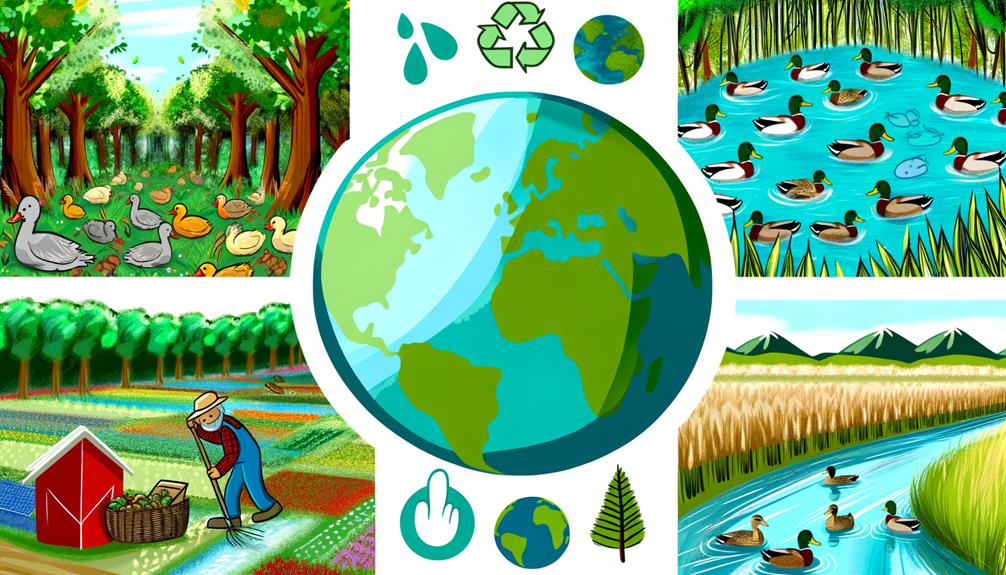Imagine your fork as a powerful tool for change: with every plant-based bite, you're not just nourishing your body but also sowing seeds for a more sustainable world. You've likely heard that shifting to a plant-based diet can have a positive impact on the environment, but you might not know the full extent of its benefits. From the rolling pastures to the vast blue skies, your dietary choices have a ripple effect that touches every corner of the planet. By embracing fruits, vegetables, legumes, and grains, you're actively participating in reducing greenhouse gas emissions, conserving precious water resources, and protecting natural habitats. As you continue to explore these six pivotal environmental advantages, you'll uncover compelling reasons that showcase how a plant-based lifestyle is not just a personal health choice but a collective step towards healing the Earth. Let's examine the intricate ways in which your dinner plate can double as a palette for ecological preservation.
Key Takeaways
- Plant-based diets significantly reduce greenhouse gas emissions and contribute to climate change mitigation.
- Choosing plant-based options helps conserve natural habitats, protect biodiversity, and reduce deforestation and habitat destruction.
- Plant-based diets conserve water resources and alleviate water scarcity in regions with limited water availability.
- Plant-based living promotes energy efficiency, reduces overall energy consumption, and decreases reliance on fossil fuels.
Reducing Greenhouse Gases
By shifting to plant-based diets, you're not only nourishing your body but also significantly cutting down on the greenhouse gases that meat production so heavily emits. The meat industry is a major contributor to these harmful emissions, with animal agriculture accounting for a considerable share of methane emissions—a potent contributor to climate change.
Embracing a diet rich in plants rather than animal products, you're taking a powerful step towards reducing your carbon footprint. It's not just about cutting out meat entirely; even modest shifts can have an impact. By including smaller amounts of fish, meat, and dairy, you're still contributing to environmental sustainability. It's about balance and being mindful of the choices you make at the dinner table.
You have the potential to lessen your impact on our planet significantly. Plant-based diets require less energy and reduce our water usage, which are critical factors in combating climate change. By serving others and the earth, you're part of a compassionate movement that prioritizes health—both human and environmental. In this way, you're not only looking after your own well-being but also nurturing the world around you.
Minimizing Land Degradation
Shifting your diet to include more plant-based foods not only nourishes your health but also plays a crucial role in minimizing land degradation and promoting sustainable land use. By choosing plant foods, you're supporting a system of food production that requires less land and helps maintain the delicate balance of our ecosystems.
Here's how a plant-based lifestyle contributes to sustainable land management:
- Reduction in Land Use for Livestock: By eating fewer meat and dairy products, you're decreasing the demand for animal agriculture, which is a major driver of land degradation.
- Efficient Use of Cropland: Plant foods generally require less land to produce than animal products, freeing up space for natural habitats and reducing environmental impacts.
- Conservation of Water Resources: Plant-based diets contribute to lower global water use, as growing crops typically requires less water than raising animals.
- Mitigation of Greenhouse Gases: Sustainable food choices like plant-based diets can significantly lower the production of greenhouse gases linked to animal farming, thus mitigating climate change and protecting land resources.
Your compassionate choice to prioritize plant-based foods not only serves your wellbeing but also serves the planet by fostering the health of our lands for generations to come.
Lowering Water Usage
Embracing a plant-based diet isn't just about the food on your plate; it's also a powerful step toward drastically cutting down on water usage. You're not only nourishing your body with wholesome nutrients but also contributing to global freshwater conservation. By choosing plant-based foods, you're part of a compassionate movement that ensures less water is utilized for agriculture.
Consider this: producing a single pound of beef can swallow up between 2000 to 8000 gallons of water. In contrast, plant-based alternatives like tofu demand only 302 gallons for the same weight. That's a monumental saving, don't you think? Switching from beef production to plant-based protein sources not only meets your dietary needs but does so with a fraction of the water footprint.
The consumption of animal products is notoriously water-intensive. For instance, it takes about 1950 gallons of water to produce just one gallon of cow's milk. Opting for oat milk instead, which requires merely 290 gallons per gallon, showcases the staggering difference in water efficiency. Diets associated with plant-based eating are undeniably gentler on our planet's precious water resources. You're serving the environment and humanity by making mindful choices that safeguard water for future generations.
Mitigating Pollution
While you're conserving water with a plant-based diet, you're also combating pollution, as this way of eating significantly cuts down on the harmful emissions that degrade our air quality. Embracing a lifestyle rich in vegetables, fruits, and legumes, rather than one heavy in animal foods, can have a profound positive impact on the climate crisis we all face. Here's how plant-based diets are a breath of fresh air for our environment:
- Reduces Greenhouse Gas Emissions: By minimizing methane release from livestock, you're directly contributing to lower overall carbon emissions.
- Less Land Degradation: Shifting away from diet-related land use reduces the need for deforestation and mitigates land pollution.
- Encourages Less Processing: Plant-based foods typically require less processing, meaning fewer pollutants are released into the atmosphere.
- Supports Sustainable Practices: When governments reallocate subsidies from animal agriculture to plant-based options, the result is a significant decrease in environmental impact.
Fostering Biodiversity
By choosing a plant-based lifestyle, you're not only nurturing your health but also contributing to the preservation of diverse ecosystems essential for a resilient environment. Every meal you have that's rich in plant-based foods helps support environmental health by encouraging the growth of a wider variety of crops. This supports genetic diversity, which is vital for adapting to changing climates and protecting our food supply.
Your compassionate choices mean less land is used for meat production, which often leads to deforestation and loss of habitats. With fewer animals raised for food, natural resources are conserved, and the emissions contributing to the Greenhouse effect are significantly reduced. This not only lessens the impact on the environment but also fosters biodiversity on a grand scale.
Moreover, when you opt for plant-based options, you're reducing the pressure on our oceans, allowing marine life to thrive. The shift away from monocultures in farming, a direct result of lower demand for animal feed, leads to healthier soil and a more biodiverse agricultural landscape. In essence, your plant-based diet is a powerful tool for nurturing the planet's vast array of life.
Diminishing Energy Consumption
Your choice to eat plant-based not only bolsters biodiversity but also plays a significant role in curbing energy consumption linked to food production. When you opt for plant-based diets, you're tapping into a more energy-efficient way to feed the global food supply. This shift is instrumental in reducing greenhouse gas emissions from the meat industry, which notably produce methane—a potent contributor to global warming.
By embracing Plant-Based Dietary Patterns, you're part of the collective effort to lessen our carbon footprint. Here's how your dietary choices are making a difference:
- Lowering Energy Demands: Plant-based foods generally require less energy to grow, prepare, and transport compared to animal products.
- Reducing Reliance on Fossil Fuels: The meat industry heavily relies on fossil fuels. Your plant-based choices decrease this reliance, thereby diminishing overall energy consumption.
- Cutting Down Greenhouse Gases: Vegan diets contribute to lower carbon emissions, directly impacting the environment positively.
- Conserving Earth's Resources: The production of animal products is energy-intensive. Your plant-centric lifestyle helps preserve these valuable resources.
Embracing a compassionate lifestyle through plant-based eating, you're not just serving yourself; you're actively participating in a global movement towards a more sustainable and kinder future.
Frequently Asked Questions
How Is Plant-Based Better for the Environment?
You'll lower your carbon footprint, conserve water, and enhance soil health by going plant-based. It reduces deforestation, methane emissions, and agricultural runoff, while increasing energy efficiency, ocean conservation, and promoting biodiversity with less pesticide use.
What Are the Benefits of Living Plant-Based?
You'll enjoy health benefits and contribute to sustainable living by embracing plant-based foods, leading to water conservation, soil preservation, and biodiversity protection while promoting ethical farming and ecological balance.
Is Being Vegetarian Actually Better for the Environment?
Yes, adopting vegetarianism is better for the environment. It leads to resource efficiency, reduces your water footprint, preserves soil, ensures animal welfare, conserves biodiversity, improves ocean health, fosters ethical consumption, and lessens deforestation and pesticide use.
How Does Plant-Based Diet Help Climate Change?
You'll fight climate change by adopting a plant-based diet, leading to carbon reduction, methane decline, and less reliance on fossil fuels. You'll also support deforestation decrease, water conservation, and biodiversity protection.







